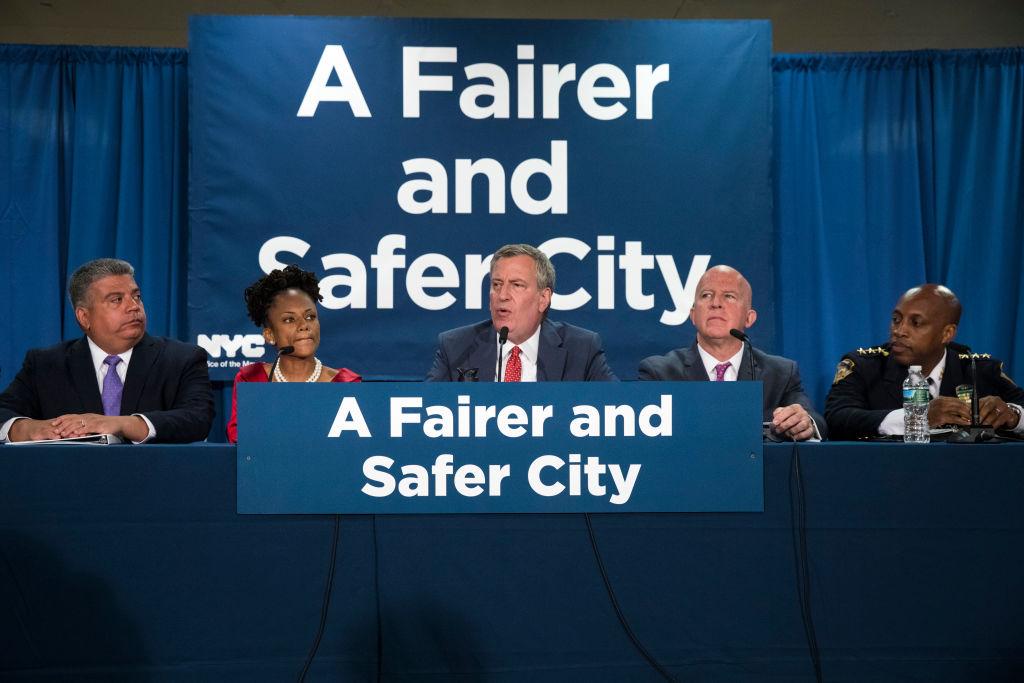Public Defenders Say New York’s New Policy To Reduce Marijuana Arrests Doesn’t Go Far Enough
The exceptions to the policy change could actually worsen the racial disparities in marijuana-related arrests, defense attorneys told The Appeal.

A new New York Police Department policy to reduce arrests for some people caught smoking marijuana in public kicked in on Sept. 1, but it’s not clear if much will change on the ground. The policy, announced by Mayor Bill de Blasio and NYPD Commissioner James O’Neill in June, said people would be stopped by police and given a criminal summons when smoking in public. However, in certain cases people would still be subject to arrest, including if they are on parole or probation, have a warrant out for their arrest, don’t have an ID, have one prior unsealed arrest in the past three years for a “violent” charge—which includes felony weapon possession or felony assault, or if they are an immediate danger to public safety—such as using marijuana while driving a car. The city expects the change will reduce arrests by about 10,000 each year.
It’s not yet clear how quickly law enforcement officers are adopting the new policy. Rebecca Kavanagh, a public defender in New York, said she defended a 16-year-old charged with marijuana possession at the beginning of the month and that her colleagues saw a marijuana arraignment last weekend. Scott Hechinger, senior staff attorney and director of policy at Brooklyn Defender Services said that he has yet to see any low-level marijuana arraignments in Brooklyn in September. However, he emphasizes that any desk appearance tickets would take about two weeks before a court appearance.
The change was announced after the NYPD drew criticism from the City Council and the public for racial disparities in marijuana arrests. Last year, 87 percent of people arrested for smoking marijuana were Black or Latino. According to a New York Times investigation, Black New Yorkers are eight times more likely to be arrested for a low-level marijuana charge than a white person. In a City Council hearing earlier this year, the NYPD testified that the racial disparities were due to a larger number of 311 and 911 calls in certain neighborhoods. However, the Times investigation into the citywide racial disparities debunked this claim.
Many public defenders in New York are not optimistic that the change will address these disparities. The exceptions to the summons policy could make it even worse, said Hechinger.
“We’re really disturbed by the senseless carve-outs in his policy that we know are simply going to mimic the same racial disparities that already existed in marijuana enforcement,” Hechinger told The Appeal. “By arresting people for marijuana if they have a record, by arresting people for marijuana if they happen to be on parole—those people, more often than not, are going to be people of color who only live in certain neighborhoods. Because those are the people who are targeted. Those are the people who are arrested, not because they commit more crime but because they are overpoliced.”
And when it comes to summonses for marijuana, racial disparities already mirror those of marijuana arrests. From January to June this year, 80 percent or more of the people who received a summons for marijuana were Black or Latinx, according to the New York Times.
Those who are given a summons for smoking marijuana will be charged with a violation, not a crime, said Patrick Gallahue, a spokesperson for the mayor. If someone fails to show up in court for a criminal summons, an arrest warrant is issued.
“We want no arrests, no tickets, no fines, as happens for nearly all white people who smoke, so marijuana use cannot be a pretext for continued harassment of mostly Black and/or Latinx New Yorkers,” Jared Chausow, senior policy specialist at Brooklyn Defender Services, told The Appeal.
When asked in a June press conference if he expected to see a change in racial disparities under his plan, de Blasio said, “So right away, the question is, how do we reduce unnecessary arrests? This is already proven to be a very positive thing for this city. …That’s the thing I’m quite certain you’re going to see progress on quickly, in the process you’re inherently addressing disparity.”
Kavanagh believes the policy change is a maneuver to avoid transparency in arrest statistics, and points out that people could still be charged with crimes in the future through summonses. “It’s a little bit of smoke and mirrors,” she told The Appeal. “You can charge people with misdemeanors through summonses … [and] you can really manipulate arrest statistics.”
Public defenders say as long as marijuana is illegal, the NYPD can use it as a pretext for stops and searches that would otherwise be unconstitutional.
“What we see on the front line as public defenders, the odor of marijuana or the alleged possession of marijuana is still used as pretext in a large number of cases to unconstitutionally stop, search and arrest client of ours for other things,” Hechinger said. “It’s [marijuana] prohibition which still continues to drive broken windows policing, given what we see on the ground, even if people aren’t ultimately arrested for marijuana.”
In June, de Blasio said he’s “not there yet” on legalization but has convened a mayoral task force to determine the “regulatory framework” for legalization. Governor Andrew Cuomo formed a working group in August to draft legislation that would legalize recreational use for adults and is currently holding “listening sessions” on legalization. But the timeline for legalization is still murky.
Kavanagh said that as long as cops are allowed to stop people for marijuana it will “still [be] a way of harassing young Black and brown people even if it’s not then going to be used in a way to give people criminal records.”
